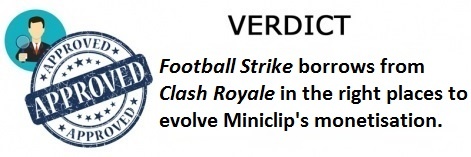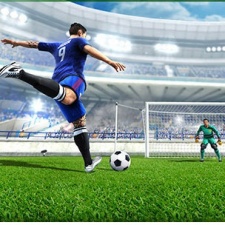Welcome back to the In-App Purchase Inspector - our regular look at free-to-play games from the consumer's perspective.
In each instalment, we consider the incentives or pressure applied to make in-app purchases, their perceived value, the expansion offered by IAPs and the overall value of the experience.
The end goal is to see whether the game makes a good enough case for us to part with our cash, or whether players are content - or engaged enough - to 'freeload'.
This time we're taking a look at Football Strike, the latest in a long line of sports-based PvP games from Miniclip, which the studio will surely hope can join a select group of highly-grossing football games.
The beautiful game
After hitting upon a seemingly evergreen mobile hit in 8 Ball Pool, Miniclip has gone on to repeat the trick with Soccer Stars, Bowling King, Archery King and Basketball Stars.
The quick-fire PvP formula has been established as one that can be easily applied to almost any competitive sport, but it has also evolved significantly over time.
Soccer Stars launched back in 2014, but that was a relatively simplistic evolution of 8 Ball Pool's gameplay. Turn-based and top-down, it revolved around flicking pucks at a ball to score past your opponent.
But with Archery King, and Basketball Stars particularly, Miniclip added 3D visuals and a greater level of mechanical complexity to the familiar format. Football Strike brings the world's favourite sport up to the same standard.
Crucially, though, the gameplay remains quick and simple, with three modes.
Shooting Race has you and an opponent competing to hit targets in real-time, Free Kicks has two players swapping between goalkeeper and set-piece taker to see who can score the most, while Career Mode presents a mix of challenges against steadily tougher opponents.
It's a gamble
Anyone with experience of Miniclip's games will be instantly familiar with the essential risk-versus-reward mechanic at play in Football Strike.
Each game mode has an entry fee and a reward for winning (both in soft currency Coins), with the higher tiers naturally inviting a stiffer level of competition. So while you have a good chance of doubling your Gold, it's also easy to lose your stake when attempting to go too big too quickly.
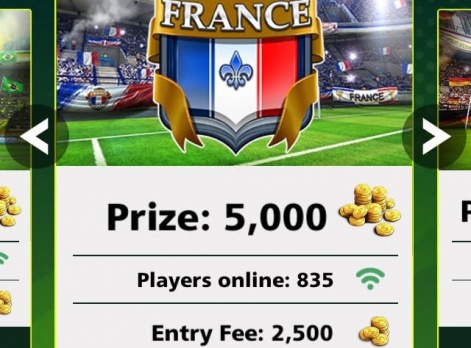
Coins, then, are an extremely important resource. They can be bought using real money, in packs ranging from $1.99 for 20,000 to $99.99 for two million.
Free Coins are available every two hours.
However, as the game is so reliant on the player having Coins to play, it benefits neither them nor Miniclip for the currency to totally dry up. As such, free Coins are available every two hours.
A modernised formula
But while the flow of Coins was pretty much the only monetisation hook in older Miniclip titles like Soccer Stars, Football Strike has more ways to encourage spending.
First, as has seemingly become law among free-to-play mobile PvP games, the Clash Royale model of timed rewards in four slots is repeated here.
This gives hard currency Cash its primary function, that being to skip the timers and open these Bags – the equivalent of Clash Royale's chests – straight away.
There's nothing to stop the player continuing as normal when all these slots are filled, but any Bags earned in this time will simply be lost.
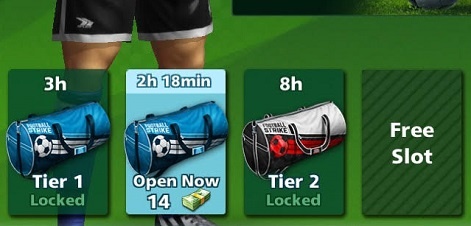
A more up-front way of limiting session length and encouraging spending is an energy system of sorts, albeit one that is only depleted by losses and applies only to Career Mode.
Each Match, as the energy currency is called, takes two hours to restore. Three failed attempts is enough to fully exhaust your supply, at which point you can spend 35 Cash (approximately $0.35) to fully restore Matches.
You can spend $1.99 to play unlimited matches for 24 hours.
Another option, seemingly inspired by a similar system in First Touch Games' Score! Hero, is to spend $1.99 to get unlimited matches for 24 hours.
The Career Mode's energy gating is also offset by increasing Cash rewards for completing each seven-stage set of challenges.
Time for an upgrade
There's more Clash Royale inspiration in Football Strike than just the timed rewards.
Supercell's card upgrade system is also adopted for the game's permanent stats – Power, Accuracy, Curve and Goalkeeping – which can be upgraded by combining duplicated stat cards, found in Bags.
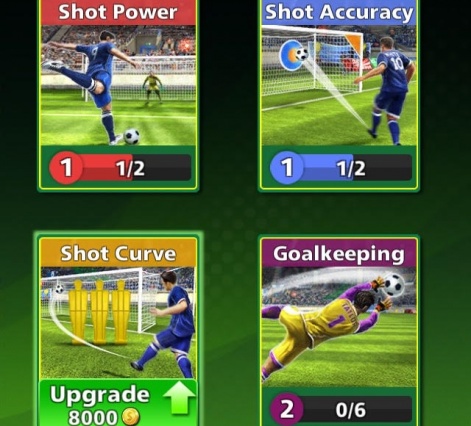
The same system is used for upgrading balls, each of which are unique in their design and have different stats for accuracy, power and curve.
Predictably, the stat and ball upgrading process also requires a considerable number of Coins.
Official kits of Barcelona, Borussia Dortmund, FC Schalke and Zenit St. Petersburg are available.
For those wanting to speed up this process, there is a Ball Shop with rotating stock that sells rarer balls for Cash.
Premium (190 Cash, approx. $1.90), Champion (390 Cash, approx. $3.75) and VIP (900 Cash, approx. $8.17) level Bags can also be bought and opened immediately from the store.
You get what you pay for
Then there are the premium kits. Purely aesthetic, $4.99 will let you kit out your player in the official kits of Barcelona, Borussia Dortmund, FC Schalke or Zenit St. Petersburg.
$4.99 will also get you a Starter Bundle, containing 500 Cash, 50,000 Coins and one Champion Bag – a very solid deal with a total saving of 70%.
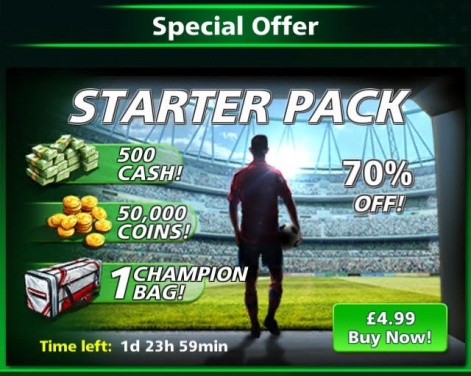
All things considered, then, Football Strike shows an evolution in the way Miniclip approaches monetisation. It now has a strategy to match its compulsive PvP gameplay, and worthy reference points in Clash Royale and Score! Hero will surely pay dividends.
Whether or not the result is a more enjoyable experience is less clear, but Football Strike crucially keeps the Coins flowing and allows the player to compete in Shooting Race and Free Kicks modes unimpeded.
All else can be ignored, if you really want to. And it's hard to have any complaints with that.
